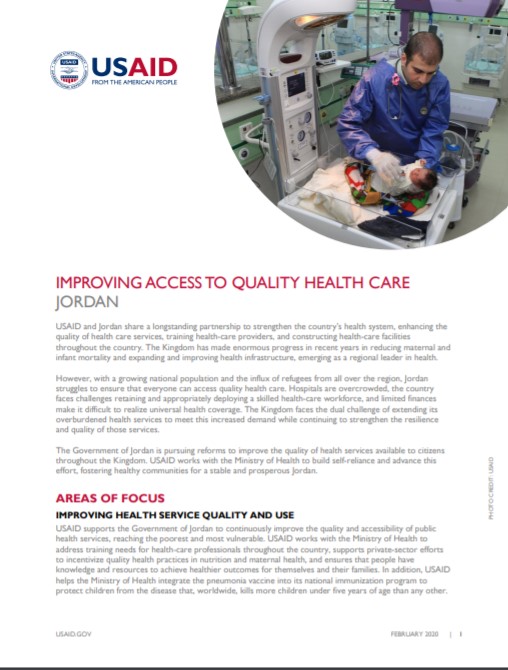Speeches Shim
USAID and Jordan share a longstanding partnership to strengthen the country’s health system, enhancing the quality of health care services, training health-care providers, and constructing health-care facilities throughout the country. The Kingdom has made enormous progress in recent years in reducing maternal and infant mortality and expanding and improving health infrastructure, emerging as a regional leader in health. However, with a growing national population and the influx of refugees from all over the region, Jordan struggles to ensure that everyone can access quality health care. Hospitals are overcrowded, the country faces challenges retaining and appropriately deploying a skilled health-care workforce, and limited finances make it difficult to realize universal health coverage. The Kingdom faces the dual challenge of extending its overburdened health services to meet this increased demand while continuing to strengthen the resilience and quality of those services. The Government of Jordan is pursuing reforms to improve the quality of health services available to citizens throughout the Kingdom. USAID works with the Ministry of Health to build self-reliance and advance this effort, fostering healthy communities for a stable and prosperous Jordan.
AREAS OF FOCUS
IMPROVING HEALTH SERVICE QUALITY AND USE
Fact Sheet: Improving Access to Quality Health Care ![]() (pdf - 275k)
(pdf - 275k)
USAID supports the Government of Jordan to continuously improve the quality and accessibility of public health services, reaching the poorest and most vulnerable. USAID works with the Ministry of Health to address training needs for health-care professionals throughout the country, supports private-sector efforts to incentivize quality health practices in nutrition and maternal health, and ensures that people have knowledge and resources to achieve healthier outcomes for themselves and their families. In addition, USAID helps the Ministry of Health integrate the pneumonia vaccine into its national immunization program to protect children from the disease that, worldwide, kills more children under five years of age than any other.
STRONG HEALTH SYSTEMS
Jordan’s healthy future depends on a strong, sustainable health system. USAID builds the ministry’s capacity to efficiently utilize systems to track maternal deaths, combat antimicrobial resistance, and monitor continuous professional development for health-care workers. USAID also supports the Government of Jordan to increase the efficiency of public health spending in order to ensure the fiscal sustainability of the country’s health system and accelerate progress toward universal health coverage so that everyone can access quality health care.
EXPANDED HEALTH INFRASTRUCTURE
Critical health facilities in Jordan are underequipped and overcrowded, threatening the quality of core health services. To address this challenge, USAID works with the Ministries of Health and of Public Works and Housing do identify and address major infrastructure needs. This includes the expansion of the emergency department of Al Bashir Hospital in Amman, which serves 50,000 patients a month, including some of the most vulnerable in Jordan.
NOTEWORTHY ACHIEVEMENTS
- In 2019, the Ministry of Health used the USAID-supported Performance Management Information System to save Jordan’s public health sector 18 million USD by helping hospitals track their expenditures and assess the actual need for new health infrastructure, resulting in the cancellation of several planned, non-essential facilities.
- Since 2002, USAID has renovated and modernized 349 health facilities across the Kingdom, including Princess Rahma Pediatric Hospital, the only pediatric referral hospital for the four northern governorates, which serves nearly 60,000 children each year. USAID’s expansion and renovation of the hospital expanded its capacity by 35 percent and provided it with the equipment to deliver critical health services for children of all nationalities.
- Jordan is one of the few middle-income countries with reliable, up to date data on maternal mortality thanks to Jordan’s Maternal Morality Surveillance and Response System launched with USAID support. By recording maternal deaths and their causes, the system helps Jordan generate actionable data, enabling decision makers to identify root causes of maternal deaths, implement targeted interventions, and monitor their effectiveness.
- In 2019, USAID signed a Joint Financing Agreement with the Governments of Denmark and Jordan, creating a multi-donor account to support the Ministry of Health to provide health services for Syrian refugees in Jordan. Since the signing, USAID has convened additional donors, generating $75 million in funds and $60 million in complementary technical assistance.


Comment
Make a general inquiry or suggest an improvement.